What are Kali Yuga prophecies (predictions) (Srimad Bhagavatam) (Bhagavata Purana) | What is the prediction of Kali Yuga? | What Bhagavad Gita says about Kali Yuga? | Which God will born in Kali Yuga? | What Shri Krishna told about Kali Yuga? | Sins of Kaliyuga | Predictions of Kaliyuga | What will happen in Kalyug end | Lord Krishna predictions about Kaliyuga
Namaste friends, how are you doing today? Welcome to #BhagavanBhakthi website / blog.
Bhagavan Lord Sri Krishna (Vishnu) (Rama) (Trivikrama) and Goddess Sri Lakshmi blessings to you and your family!
In this website / blog, you will always learn about #Hinduism #Sanskrit language.
Also subscribe to my YouTube channel from this link #BhagavanBhakthi to view videos about #Hinduism #Sanskrit language.
Just before going to “What are Kali Yuga prophecies (predictions) (Srimad Bhagavatam) (Bhagavata Purana) | What is the prediction of Kali Yuga? | What Bhagavad Gita says about Kali Yuga? | Which God will born in Kali Yuga? | What Shri Krishna told about Kali Yuga? | Sins of Kaliyuga | Predictions of Kaliyuga | What will happen in Kalyug end | Lord Krishna predictions about Kaliyuga“, let us know a brief, basic and very important information.
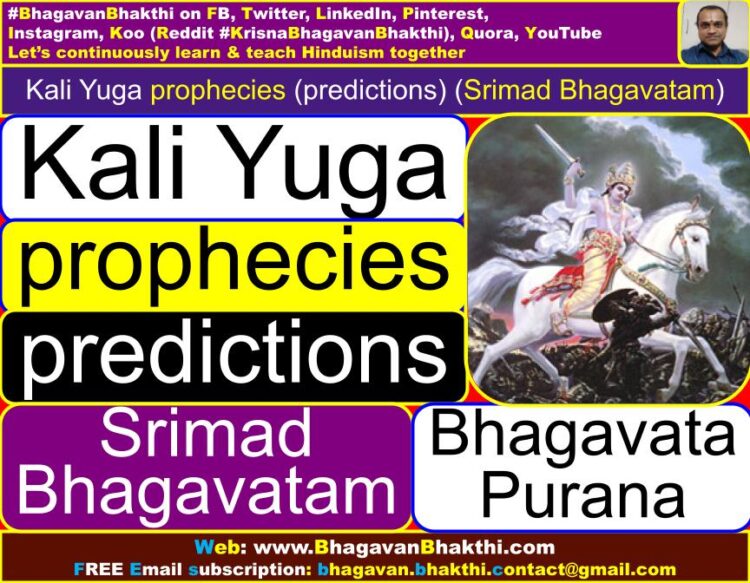
Introduction : We should note that Srimad Bhagavad Gita is the brief about all the Vedas, Srimad Bhagavatam, Ramayana, Mahabharata, etc. Thus what is said in Bhagavad Gita is said in Srimad Bhagavatam (Bhagavata Purana) also.
The last chapter of the Srimad Bhagavatam or Bhagavata Purana lists out the ‘bhavishya vani’ (predictions and prophecies) about the dark times for the present Yuga (era) of Kali Yuga.
The following bhavishya vani / predictions, written more than 5,000 years ago by Lord (Sage) Sri Vedavyasa (he is an avatar of Lord Sri Vishnu), are simply amazing.
This is because all these bhavishya vani / predictions appear to be 100% accurate.
Despite of the dark side and negativity of these bhavishnya vani / prophecies, there is still one bright symbol for all of us, which we will see at the end of this post.

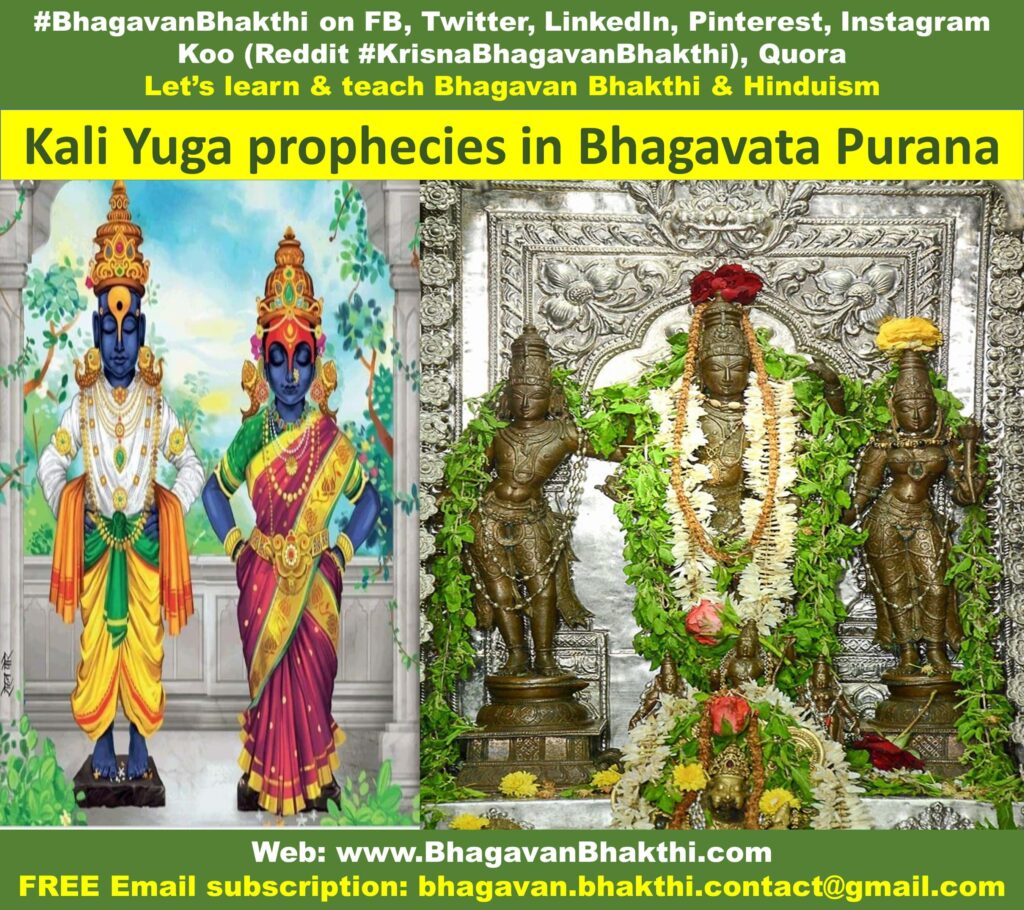
Bhavishnya vani / Prediction 1 | Srimad Bhagavatam 12.2.1 says:
श्रीशुक उवाच | ततश्चानुदिनं धर्म: सत्यं शौचं क्षमा दया । कालेन बलिना राजन् नङ्क्ष्यत्यायुर्बलं स्मृति: ॥ १ ॥
śrī–śuka uvāca | tataś cānu-dinaṁ dharmaḥ satyaṁ śaucaṁ kṣamā dayā | kālena balinā rājan naṅkṣyaty āyur balaṁ smṛtiḥ ||
Word by word explanation: śrī-śukaḥ uvāca — Śukadeva Gosvāmī said; tataḥ — then; ca — and; anudinam — day after day; dharmaḥ — religion; satyam — truth; śaucam — cleanliness;
kṣamā — tolerance; dayā — mercy; kālena — by the force of time; balinā — strong; rājan — O King Parīkṣit; naṅkṣyati — will become ruined; āyuḥ — duration of life; balam — strength; smṛtiḥ — memory.
Shuka Muni (Shukacharya) said: Dharma, satyam / truthfulness, saucham / cleanliness, kshama / tolerance, daya / mercy, duration of life, physical strength and memory all will diminish day by day.
This because of the powerful influence of the age of the Kali in the Kali Yuga. (Duryodhana is an avatar of Kali of Kali Yuga.)
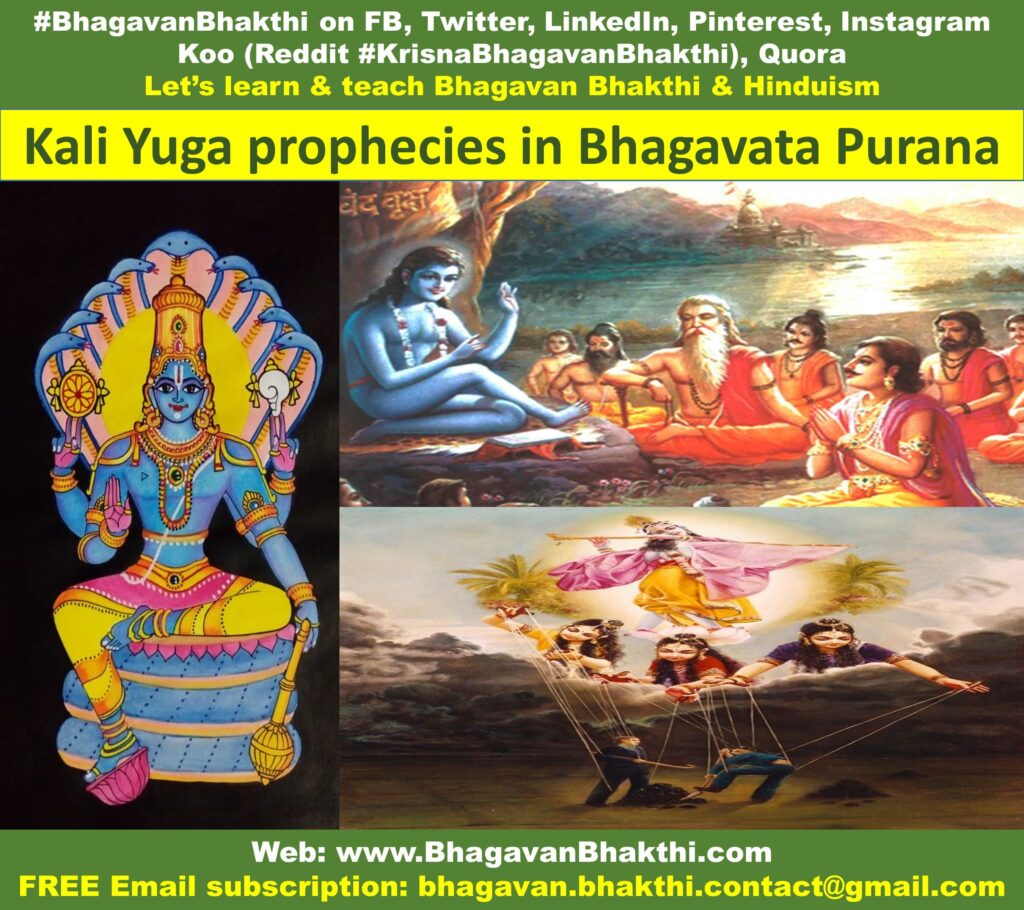
Bhavishya vani / Prediction 2 | Srimad Bhagavatam 12.2.2 says:
वित्तमेव कलौ नृणां जन्माचारगुणोदय: । धर्मन्यायव्यवस्थायां कारणं बलमेव हि ॥ २ ॥
vittam eva kalau nṝṇāṁ janmācāra-guṇodayaḥ | dharma-nyāya-vyavasthāyāṁ kāraṇaṁ balam eva hi ||
Word by word explanation: vittam — wealth; eva — alone; kalau — in the Age of Kali; nṝṇām — among men; janma — of good birth; ācāra — good behavior; guṇa — and good qualities;
udayaḥ — the cause of manifestation; dharma — of religious duty; nyāya — and reason; vyavasthāyām — in the establishment; kāraṇam — the cause; balam — strength; eva — only; hi — indeed.
In this dark Kali Yuga, wealth alone will be considered the sign of a man’s good birth, proper behaviour and fine qualities. While law and justice will be applied only on the basis of one’s power.
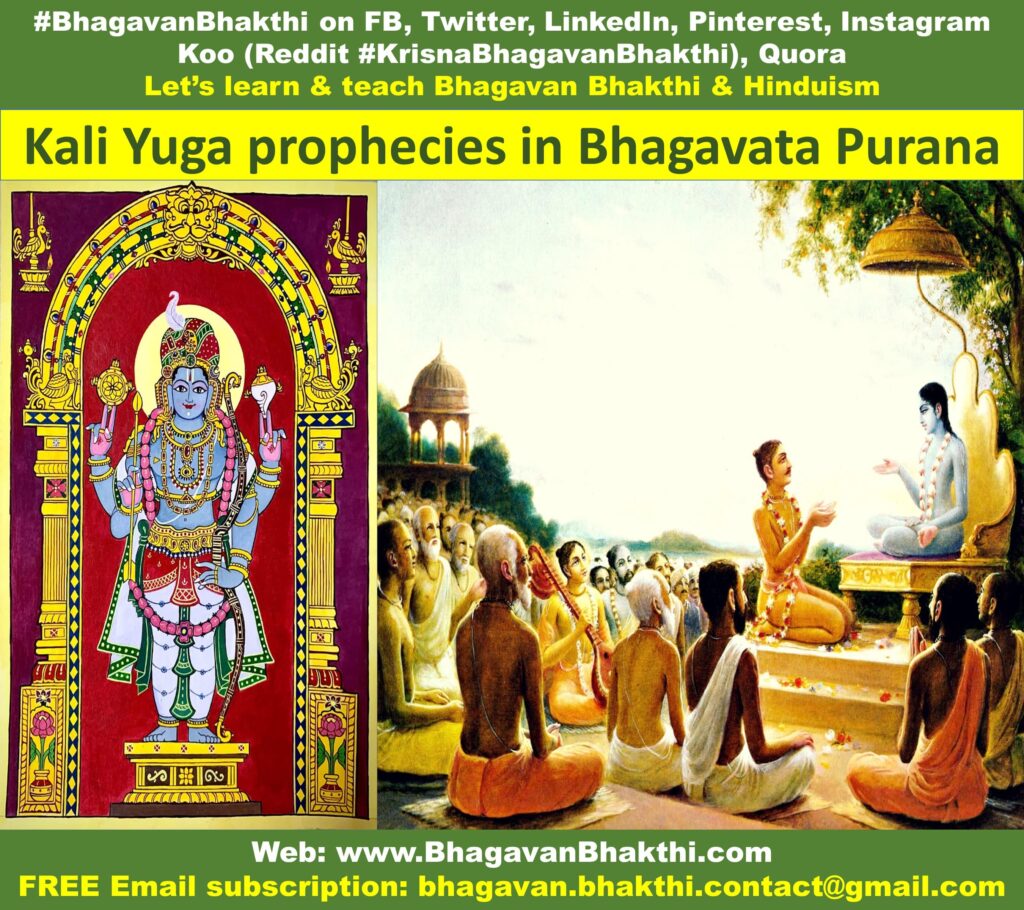
Bhavishnya vani / Prediction 3 | Srimad Bhagavatam 12.2.3 says:
दाम्पत्येऽभिरुचिर्हेतुर्मायैव व्यावहारिके । स्त्रीत्वे पुंस्त्वे च हि रतिर्विप्रत्वे सूत्रमेव हि ॥ ३ ॥
dāmpatye ’bhirucir hetur māyaiva vyāvahārike | strītve puṁstve ca hi ratir vipratve sūtram eva hi ||
Word by word explanation: dām-patye — in the relationship of husband and wife; abhiruciḥ — superficial attraction; hetuḥ — the reason; māyā — deceit; eva — indeed; vyāvahārike — in business;
strītve — in being a woman; puṁstve — in being a man; ca — and; hi — indeed; ratiḥ — sex; vipratve — in being a brāhmaṇa; sūtram — the sacred thread; eva — only; hi — indeed.
Most of the men and women will live together merely because of superficial attraction. While success in business will depend on deceit.
Womanliness and manliness will be judged according to one’s expertise in sex, and a man will be known as a brahmana (brahmin) just by his wearing a thread (Janeu) (Yagnopaveetham) (sacred thread).

Bhavishnya vani / Prediction 4 | Srimad Bhagavatam 12.2.4 says:
लिङ्गमेवाश्रमख्यातावन्योन्यापत्तिकारणम् । अवृत्त्या न्यायदौर्बल्यं पाण्डित्ये चापलं वच: ॥ ४ ॥
liṅgam evāśrama-khyātāv anyonyāpatti-kāraṇam | avṛttyā nyāya-daurbalyaṁ pāṇḍitye cāpalaṁ vacaḥ ||
Word by word explanation: liṅgam — the external symbol; eva — merely; āśrama-khyātau — in knowing a person’s spiritual order; anyonya — mutual; āpatti — of exchange;
kāraṇam — the cause; avṛttyā — by lack of livelihood; nyāya — in credibility; daurbalyam — the weakness; pāṇḍitye — in scholarship; cāpalam — tricky; vacaḥ — words.
A person’s spiritual position will be ascertained merely according to external symbols, and on that same basis people will change from one spiritual order to the next.
A person’s propriety will be seriously questioned if he does not earn a good living. And one who is very clever at juggling words will be considered a learned scholar.
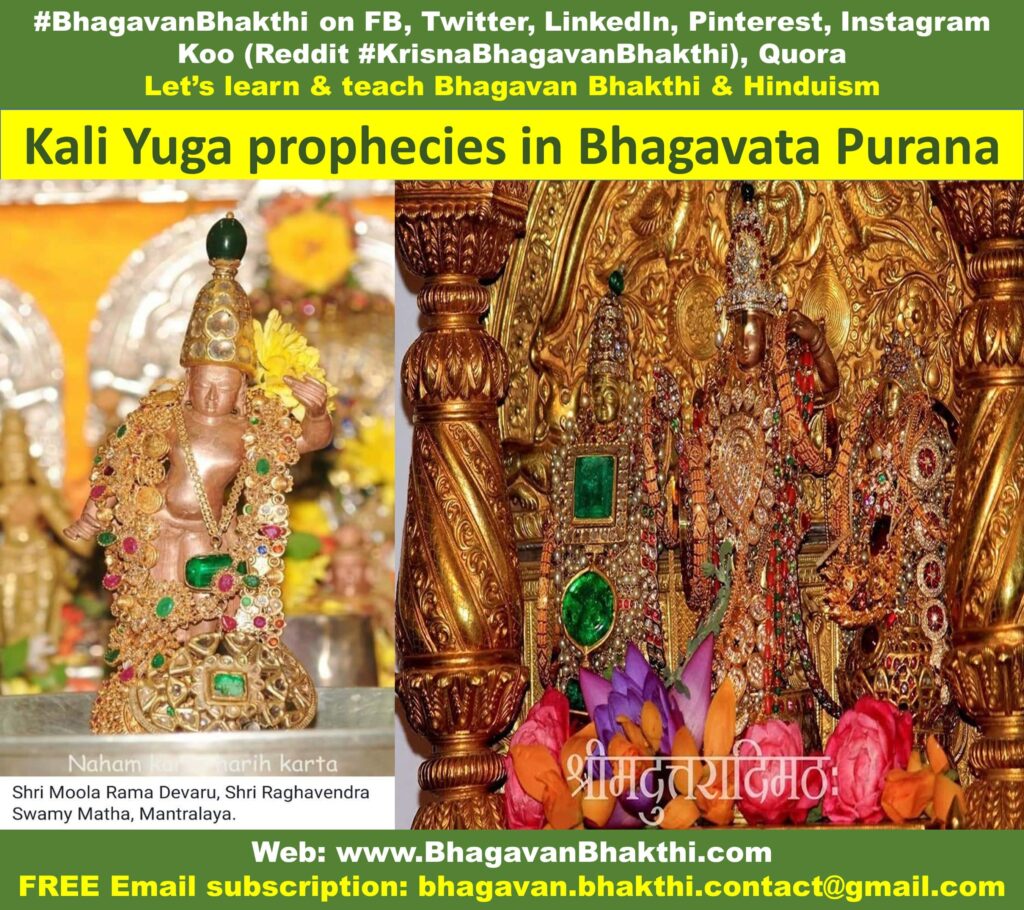
Bhavishnya vani / Prediction 5 | Srimad Bhagavatam 12.2.5 says:
अनाढ्यतैवासाधुत्वे साधुत्वे दम्भ एव तु । स्वीकार एव चोद्वाहे स्नानमेव प्रसाधनम् ॥ ५ ॥
anāḍhyataivāsādhutve sādhutve dambha eva tu | svīkāra eva codvāhe snānam eva prasādhanam ||
Word by word explanation: anāḍhyatā — poverty; eva — simply; asādhutve — in one’s being unholy; sādhutve — in virtue, or success; dambhaḥ — hypocrisy; eva — alone; tu — and;
svī-kāraḥ — verbal acceptance; eva — alone; ca — and; udvāhe — in marriage; snānam — bathing with water; eva — alone; prasādhanam — cleaning and decorating of the body.
A person will be judged unholy if he does not have money, and hypocrisy will be accepted as virtue.
Marriage will be arranged simply by verbal agreement, and a person will think he is fit to appear in public if he has merely taken a bath.
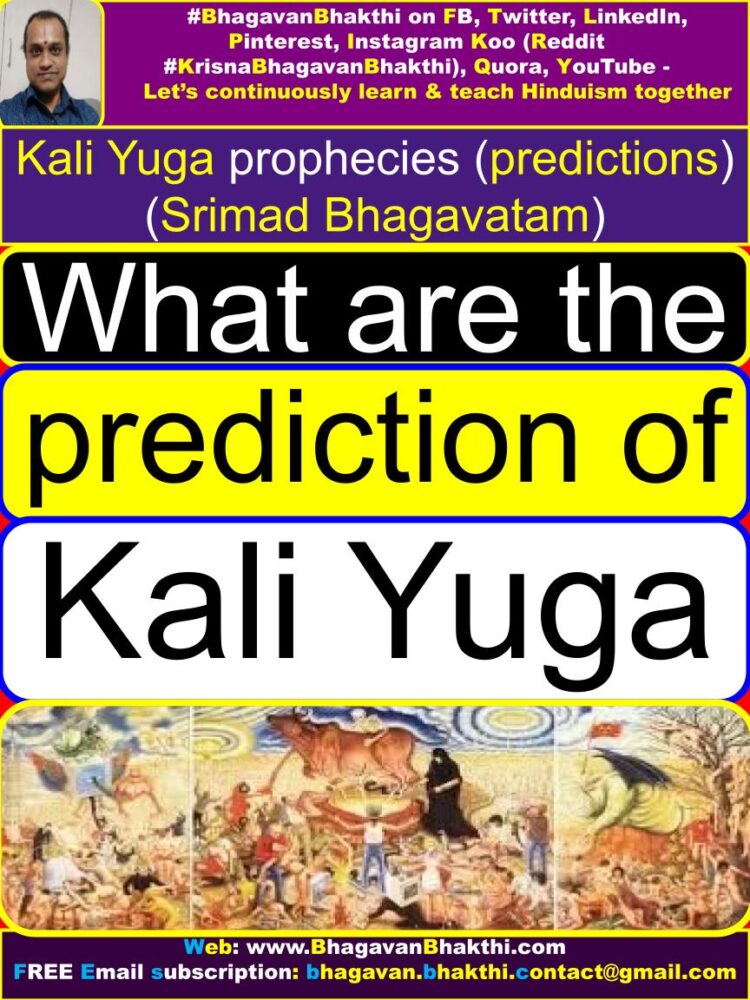
Bhavishnya vani / Prediction 6 | Srimad Bhagavatam 12.2.6 says:
दूरे वार्ययनं तीर्थं लावण्यं केशधारणम् । उदरंभरता स्वार्थ: सत्यत्वे धार्ष्ट्यमेव हि । दाक्ष्यं कुटुम्बभरणं यशोऽर्थे धर्मसेवनम् ॥ ६ ॥
dūre vāry-ayanaṁ tīrthaṁ lāvaṇyaṁ keśa-dhāraṇam | udaraṁ-bharatā svārthaḥ satyatve dhārṣṭyam eva hi | dākṣyaṁ kuṭumba-bharaṇaṁ yaśo ’rthe dharma-sevanam ||
Word by word explanation: dūre — situated far away; vāri — of water; ayanam — a reservoir; tīrtham — holy place; lāvaṇyam — beauty; keśa — hair; dhāraṇam — carrying; udaram-bharatā — filling the belly; sva-arthaḥ — the goal of life;
satyatve — in so-called truth; dhārṣṭyam — audacity; eva — simply; hi — indeed; dākṣyam — expertise; kuṭumba-bharaṇam — maintaining a family; yaśaḥ — fame; arthe — for the sake of; dharma-sevanam — observance of religious principles.
A sacred place will be taken to consist of no more than a reservoir of water located at a distance, and beauty will be thought to depend on one’s hairstyle.
Filling the belly will become the goal of life, and one who is audacious will be accepted as truthful.
He who can maintain a family will be regarded as an expert man, and the principles of religion will be observed only for the sake of reputation.

Bhavishnya vani / Prediction 7 | Srimad Bhagavatam 12.2.7 says:
एवं प्रजाभिर्दुष्टाभिराकीर्णे क्षितिमण्डले । ब्रह्मविट्क्षत्रशूद्राणां यो बली भविता नृप: ॥ ७ ॥
evaṁ prajābhir duṣṭābhir ākīrṇe kṣiti-maṇḍale | brahma-viṭ-kṣatra-śūdrāṇāṁ yo balī bhavitā nṛpaḥ ||
Word by word explanation: evam — in this way; prajābhiḥ — with populace; duṣṭābhiḥ — corrupted; ākīrṇe — being crowded; kṣiti-maṇḍale — the earth globe; brahma — among the brāhmaṇas;
viṭ — vaiśyas; kṣatra — kṣatriyas; śūdrāṇām — and śūdras; yaḥ — whoever; balī — the strongest; bhavitā — he will become; nṛpaḥ — the king.
As the earth thus becomes crowded with a corrupt population, whoever among any of the social classes shows himself to be the strongest will gain political power.
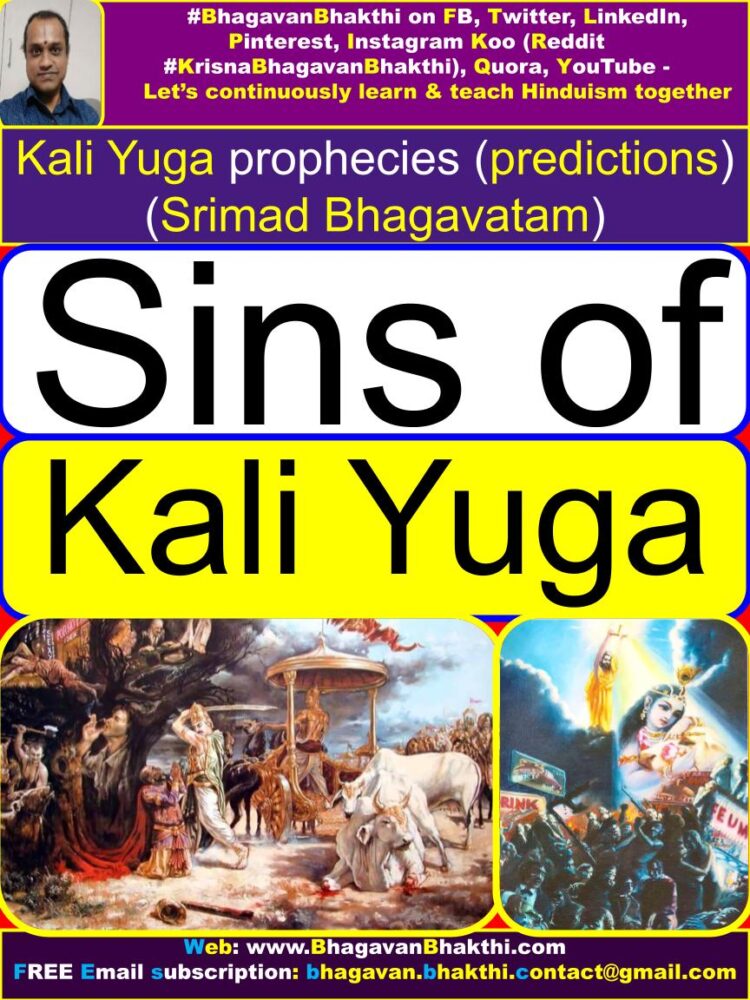
Bhavishnya vani / Prediction 8 | Srimad Bhagavatam 12.2.9 says:
शाकमूलामिषक्षौद्रफलपुष्पाष्टिभोजना: । अनावृष्टया विनङ्क्ष्यन्ति दुर्भिक्षकरपीडिता: ॥ ९ ॥
śāka-mūlāmiṣa-kṣaudra-phala-puṣpāṣṭi-bhojanāḥ | anāvṛṣṭyā vinaṅkṣyanti durbhikṣa-kara-pīḍitāḥ ||
Word by word explanation: śāka — leaves; mūla — roots; āmiṣa — meat; kṣaudra — wild honey; phala — fruits; puṣpa — flowers; aṣṭi — and seeds; bhojanāḥ — eating;
anāvṛṣṭyā — because of drought; vinaṅkṣyanti — they will become ruined; durbhikṣa — by famine; kara — and taxation; pīḍitāḥ — tormented.
Harassed by famine and excessive taxes, people will resort to eating leaves, roots, flesh, wild honey, fruits, flowers and seeds. Struck by drought, they will become completely ruined.
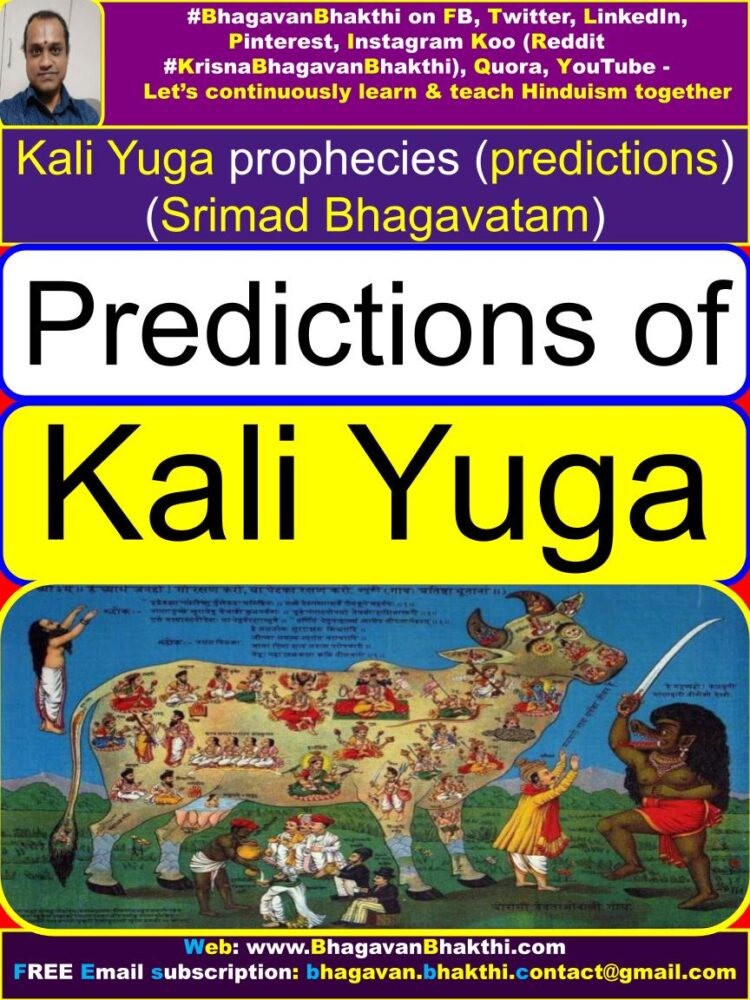
Bhavishnya vani / Prediction 9 | Srimad Bhagavatam 12.2.10 says:
शीतवातातपप्रावृड्हिमैरन्योन्यत: प्रजा: । क्षुत्तृड्भ्यां व्याधिभिश्चैव सन्तप्स्यन्ते च चिन्तया ॥ १० ॥
śīta-vātātapa-prāvṛḍ-himair anyonyataḥ prajāḥ | kṣut-tṛḍbhyāṁ vyādhibhiś caiva santapsyante ca cintayā ||
Word by word explanation: śīta — by cold; vāta — wind; ātapa — the heat of the sun; prāvṛt — torrential rain; himaiḥ — and snow; anyonyataḥ — by quarrel; prajāḥ — the citizens;
kṣut — by hunger; tṛḍbhyām — and thirst; vyādhibhiḥ — by diseases; ca — also; eva — indeed; santapsyante — they will suffer great distress; ca — and; cintayā — by anxiety.
The citizens will suffer greatly from cold, wind, heat, rain and snow. They will be further tormented by quarrels, hunger, thirst, disease and severe anxiety.
Bhavishnya vani / Prediction 10 | Srimad Bhagavatam 12.2.11 says:
त्रिंशद्विंशतिवर्षाणि परमायु: कलौ नृणाम् ॥ ११ ॥
triṁśad viṁśati varṣāṇi paramāyuḥ kalau nṛṇām ||
Word by word explanation: triṁśat — thirty; viṁśati — plus twenty; varṣāṇi — years; parama-āyuḥ — the maximum duration of life; kalau — in Kali-yuga; nṛṇām — of men.
The maximum duration of life for human beings in Kali Yuga will become 50 years.
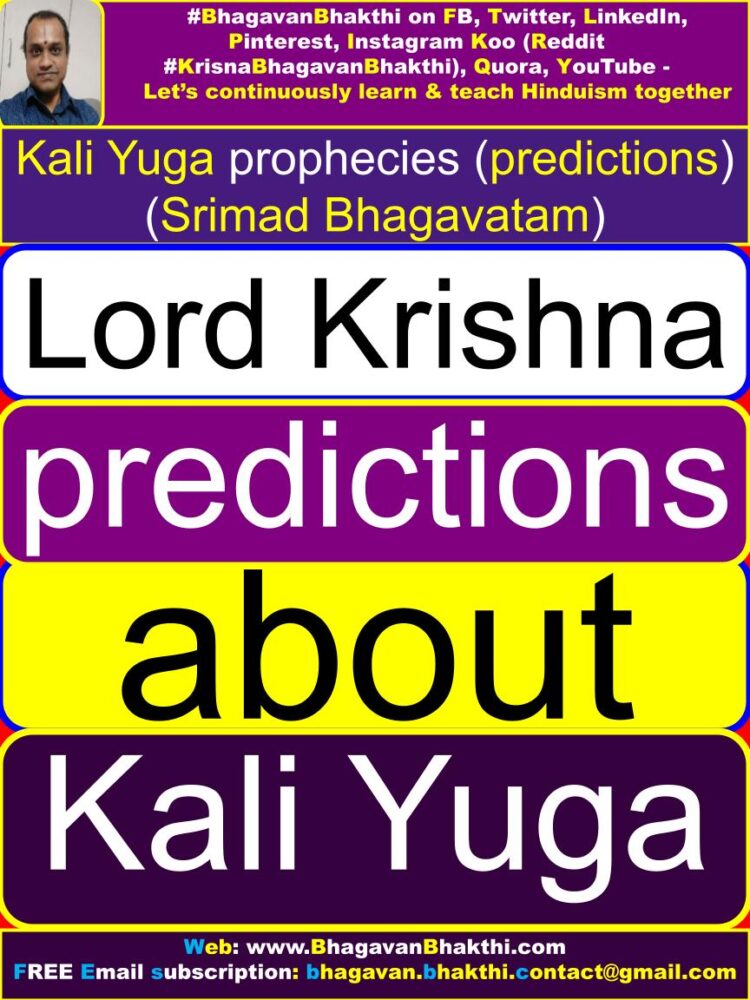
Bhavishnya vani / Prediction 11 | Srimad Bhagavatam 12.2.31 says:
तस्मात् क्षुद्रदृशो मर्त्या: क्षुद्रभाग्या महाशना: । कामिनो वित्तहीनाश्च स्वैरिण्यश्च स्त्रियोऽसती: ॥ ३१ ॥
tasmāt kṣudra-dṛśo martyāḥ kṣudra-bhāgyā mahāśanāḥ | kāmino vitta-hīnāś ca svairiṇyaś ca striyo ’satīḥ ||
Word by word explanation: tasmāt — due to these qualities of the Age of Kali; kṣudra-dṛśaḥ — shortsighted; martyāḥ — human beings; kṣudra-bhāgyāḥ — unfortunate; mahā-aśanāḥ — excessive in their eating habits;
kāminaḥ — full of lust; vitta-hīnāḥ — lacking wealth; ca — and; svairiṇyaḥ — independent in their social dealings; ca — and; striyaḥ — the women; asatīḥ — unchaste.
Because of the bad qualities of the age of Kali, human beings will become short sighted, unfortunate, gluttonous, lustful and poverty-stricken. The women, becoming unchaste, will freely wander from one man to the next.
Bhavishnya vani / Prediction 12 | Srimad Bhagavatam 12.3.41 says:
कलौ काकिणिकेऽप्यर्थे विगृह्य त्यक्तसौहृदा: । त्यक्ष्यन्ति च प्रियान् प्राणान् हनिष्यन्ति स्वकानपि ॥ ४१ ॥
kalau kākiṇike ’py arthe vigṛhya tyakta-sauhṛdāḥ | tyakṣyanti ca priyān prāṇān haniṣyanti svakān api ||
Word by word explanation: kalau — in the Age of Kali; kākiṇike — of a small coin; api — even; arthe — for the sake; vigṛhya — developing enmity; tyakta — abandoning;
sauhṛdāḥ — friendly relations; tyakṣyanti — they will reject; ca — and; priyān — dear; prāṇān — their own lives; haniṣyanti — they will kill; svakān — their own relatives; api — even.
In Kali-yuga men will develop hatred for each other even over a few coins. Giving up all friendly relations, they will be ready to lose their own lives and kill even their own relatives.
Bhavishnya vani / Prediction 13 | Srimad Bhagavatam 12.3.41 says:
शूद्रा: प्रतिग्रहीष्यन्ति तपोवेषोपजीविन: । धर्मं वक्ष्यन्त्यधर्मज्ञा अधिरुह्योत्तमासनम् ॥ ३८ ॥
śūdrāḥ pratigrahīṣyanti tapo-veṣopajīvinaḥ | dharmaṁ vakṣyanty adharma-jñā adhiruhyottamāsanam ||
Word by word explanation: śūdrāḥ — lowly, common workers; pratigrahīṣyanti — will accept religious charity; tapaḥ — by shows of austerity; veṣa — and by dressing as mendicants;
upajīvinaḥ — earning their living; dharmam — the principles of religion; vakṣyanti — will speak about; adharma-jñāḥ — those who know nothing about religion; adhiruhya — mounting; uttama-āsanam — a high seat.
Uncultured men will accept charity on behalf of the Lord and will earn their livelihood by making a show of austerity and wearing a mendicant’s dress.
Those who know nothing about religion will mount a high seat and presume to speak on religious principles.
Bhavishnya vani / Prediction 14 | Srimad Bhagavatam 12.3.36 says:
पतिं त्यक्ष्यन्ति निर्द्रव्यं भृत्या अप्यखिलोत्तमम् । भृत्यं विपन्नं पतय: कौलं गाश्चापयस्विनी: ॥ ३६ ॥
patiṁ tyakṣyanti nirdravyaṁ bhṛtyā apy akhilottamam | bhṛtyaṁ vipannaṁ patayaḥ kaulaṁ gāś cāpayasvinīḥ ||
Word by word explanation: patim — a master; tyakṣyanti — they will abandon; nirdravyam — lacking property; bhṛtyāḥ — servants; api — even; akhila-uttamam — most excellent in personal qualities;
bhṛtyam — a servant; vipannam — incapacitated; patayaḥ — masters; kaulam — belonging to the family for generations; gāḥ — cows; ca — and; apayasvinīḥ — which have stopped giving milk.
Servants will abandon a master who has lost his wealth, even if that master is a saintly person of exemplary character.
Masters will abandon an incapacitated servant, even if that servant has been in the family for generations. Cows will be abandoned or killed when they stop giving milk.
Bhavishnya vani / Prediction 15 | Srimad Bhagavatam 12.3.32 says:
दस्यूत्कृष्टा जनपदा वेदा: पाषण्डदूषिता: । राजानश्च प्रजाभक्षा: शिश्नोदरपरा द्विजा: ॥ ३२ ॥
dasyūtkṛṣṭā janapadā vedāḥ pāṣaṇḍa-dūṣitāḥ | rājānaś ca prajā-bhakṣāḥ śiśnodara-parā dvijāḥ ||
Word by word explanation: dasyu-utkṛṣṭāḥ — predominated by thieves; jana-padāḥ — the populated places; vedāḥ — the Vedic scriptures; pāṣaṇḍa — by atheists; dūṣitāḥ — contaminated;
rājānaḥ — the political leaders; ca — and; prajā-bhakṣāḥ — consuming the populace; śiśna-udara — to the genitals and belly; parāḥ — dedicated; dvijāḥ — the brāhmaṇas.
Cities will be dominated by thieves, the Vedas will be contaminated by speculative interpretations of atheists, political leaders will virtually consume the citizens, and the so-called priests and intellectuals will be devotees of their bellies and genitals.
Bhavishnya vani / Prediction 16 | Srimad Bhagavatam 12.3.42 says:
न रक्षिष्यन्ति मनुजा: स्थविरौ पितरावपि । पुत्रान् भार्यां च कुलजां क्षुद्रा: शिश्नोदरंभरा: ॥ ४२ ॥
na rakṣiṣyanti manujāḥ sthavirau pitarāv api | putrān bhāryāṁ ca kula-jāṁ kṣudrāḥ śiśnodaraṁ-bharāḥ ||
Word by word explanation: na rakṣiṣyanti — they will not protect; manujāḥ — men; sthavirau — elderly; pitarau — parents; api — even; putrān — children; bhāryām — wife;
ca — also; kula-jām — born of a proper family; kṣudrāḥ — petty; śiśna-udaram — their genitals and belly; bharāḥ — simply maintaining.
Men will no longer protect their elderly parents, their children or their respectable wives. Thoroughly degraded, they will care only to satisfy their own bellies and genitals.
MY DEAR FRIENDS, DON’T WORRY AT ALL. BUT STILL THERE IS ONE HOPE ABOUT THIS KALI YUGA as given below:
Despite all of these dark prophecies and predictions, there is one good quality in this age of Kali Yuga as given below:
Srimad Bhagavatam 12.3.42 says:
कलेर्दोषनिधे राजन्नस्ति ह्येको महान् गुण: । कीर्तनादेव कृष्णस्य मुक्तसङ्ग: परं व्रजेत् ॥ ५१ ॥
kaler doṣa-nidhe rājann asti hy eko mahān guṇaḥ | kīrtanād eva kṛṣṇasya mukta-saṅgaḥ paraṁ vrajet ||
Word by word explanation: kaleḥ — of the Age of Kali; doṣa-nidheḥ — in the ocean of faults; rājan — O King; asti — there is; hi — certainly; ekaḥ — one; mahān — very great; guṇaḥ — good quality;
kīrtanāt — by chanting; eva — certainly; kṛṣṇasya — of the holy name of Kṛṣṇa; mukta-saṅgaḥ — liberated from material bondage; param — to the transcendental spiritual kingdom; vrajet — one can go.
Although Kali-Yuga is an ocean of faults, there is still one good quality about this age:
Simply by chanting the names of Bhagavan Lord Sri Krishna (Vishnu), one can become free from all the material bondage and be promoted to the transcendental kingdoms (higher planets and finally to the Vainkuntha).
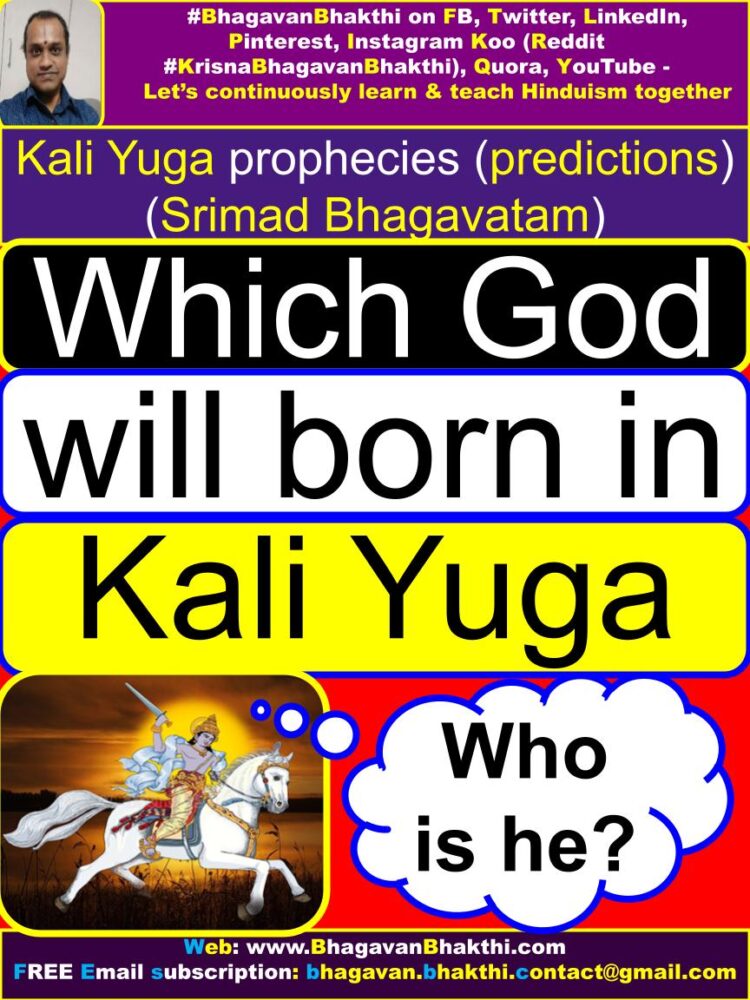
Which God will born in Kali Yuga? : At the end of Kali Yuga, Lord Sri Vishnu takes the avatar of Lord Sri Kalki and will destroy all the ‘Adharmis’ (unrighteous people) in just one day.

What will happen in Kalyug end : At the end of Kali Yuga, all the ‘Adharmis’ will be destroyed and a new Yuga called ‘Satya Yuga’ will be started by Lord Sri Kalki, an avatar of Lord Sri Vishnu.
Continue reading about Hinduism (Sanatana Dharma) :
Lord Sri Krishna information (Mahabharata, Srimad Bhagavatam, etc.)
Ramayana information, facts, significance, importance, etc.
Maharishi information, facts, importance, significance, etc.
Rivers information in Hinduism (Sanatana Dharma)
Hinduism (Sanatana Dharma) information, facts, etc.
Mahabharata information, facts, significance, importance etc.
More information will be added to his post (article) on regular basis. Please visit again to know the updated information after some time.
To watch videos on #Hinduism #Sanskrit language, SUBSCRIBE to my YouTube channel from this below link:
#BhagavanBhakthi YouTube channel
To know more about “Lord Sri Vishnu stories, information, facts, significances, etc.“, please click the below link:
Lord Sri Vishnu stories, information, facts, significances, etc.
Dear friends, if you need any clarifications about this post, kindly let me know, I will definitely try to answer all of them.
Also your one LIKE, one COMMENT, One Share, one SUBSCRIPTION is highly important.
This will help to know the quality of this content and also it will be helpful to know if any improvements is required for the content.
If you feel this content is useful to you and has helped you to improve your knowledge, kindly share this with your well-wishers.
Because “SHARING MEANS CARING”.
For receive FREE EMAIL SUBSCRIPTION about #BhagavanBhakthi, you can send an email to bhagavan.bhakthi.contact@gmail.com from your email ID.
NAMASTE!
SRI GURUBHYO NAMAHA
OM NAMO NARAYANAYA
Sri Krishnaarpanamastu
Share in Social Media
Do you know about an ancient text from a sage in India written 500-600 years ago by Achutyananda from Orissa? Bhavishya Malika
According to Bhavishya Malika, we are in final stages of kali yuga (2020-2030). an analogy is given to describe the downfall of virtues throughout the passage of time from 1) satyuga to 2) treta yuga, 3) dwapara yuga, and now 4) kali yuga.
In satyuga, the cow stands on 4 legs or pillars of virtues–cleanliness, kindness, forgiveness, and truth.
At end of satyuga, cleanliness does not exist. at end of treta yuga, kindness does not exist.
At end of dwapara yuga, forgiveness does not exist. kali yuga is the yuga where the cow is left standing on one leg–truth.
At the end of kali yuga, even the last leg of truth does not exist.
I think we are in that final stage right now. Truth is very hard to discern. Everything is a psyop.
something better is coming! another period where the cow stands on all 4 legs is on its way after all the evil on the planet is destroyed.
I find Bhavishya Malika very fascinating. There are youtubes with english subtitles, but mostly it is in the Hindi, etc.